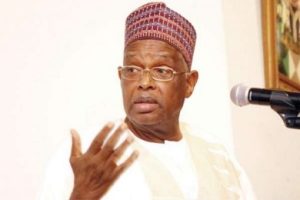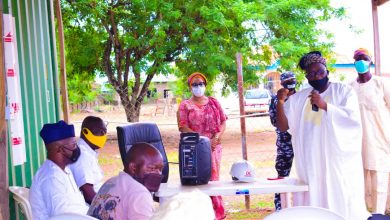
Obasanjo mourns Muhammed Uwais, Jubril Aminu
Former President, Chief Olusegun Obasanjo has mourned duo of Justice Muhammed Uwais and Prof Jubril Aminu, who recently passed on, describing two patriots to have distinguished themselves in their respective fields and served the country creditably.
Penpushing reports that Obasanjo in the letters he personally signed and sent to the bereaved families separately pointed out that the demise of the eminent jurist, marks the end of a glorious life spent largely in the judicial service of his fatherland, characterised by great learning, industry, and dedicated service.
The former President added that Nigeria will certainly miss Uwais’ exemplary leadership and commitment to the rule of law and that it is hoped that the legacy the late jurist left behind will continue to be the guiding principles of the Judiciary so as to move the country forward.

Penpushing further reports that he said the late justice traversed the judicial landscape of Nigeria for about half a century out of which over 30 years were spent in the Supreme Court.
“He was the Chief Justice of Nigeria from May 29, 1999, till when he retired from service on June 12, 2006, during which time I served as an elected civilian President of the Federal Republic of Nigeria’, Obasanjo wrote.
‘The return of democratic governance in our country in May 1999 with its emphasis on the separation of powers between the Executive, the Legislature and the Judiciary was a major challenge to all of us at the time, especially against the backdrop of military rule for almost two decades’, he added.
“I am, however, happy to say that under Justice Uwais’ leadership, the Judiciary was able to restore public confidence in the judicial process through the enthronement of the rule of law’, Obasanjo said.
“In fact, the Constitution we had to work with was written and finalized by the judiciary with Justice Uwais having a critical role to play. And for the period we worked together, he epitomised the qualities of an eminent Jurist and Elder Statesman.

“His contributions to the development and dispensation of justice in the nation were no less impressive. As the Chief Justice of Nigeria, he served his nation and his faith with diligence, honesty and professional integrity – qualities which he also demonstrated in copious measure when he presided as Chairman of the Coalition of African Jurists and Electoral Reform Committee under President Umaru Musa Yar’Adua. Even at his prime age and long after retirement, he never rested on his oars to continue to contribute to national development as a committed nationalist’.
Penpushing also reports that Obasanjo in same vein in a condolence letter to the family of Aminu described him as one of the nation’s most outstanding elder statesmen, who had brought his unique knowledge and experience into the national progress, growth and development
The statement added that Aminu had no doubt come a long way in his multi-faceted career as a scholar, medical cardiologist, policy analyst, administrator and as a diplomat.
“In the country’s history, Prof. Aminu held several positions in the academic environment where he distinguished himself as a renowned academic and scholar of no mean repute who made a mark in his field of Medicine’.
“He later became the Federal Minister of Education and subsequently of Petroleum and Mineral Resources under the regime of General Ibrahim Babangida and, by all standards, he did his best. His example has been a major source of inspiration to many others who have come to see hard work, commitment and perseverance as key factors to success’.
“It must also be acknowledged that under my administration as the President of the Federal Republic of Nigeria between 1999-2007, he served credibly well as the Nigerian Ambassador to the United States of America from 1999-2003’.

“The good work he did in the country was a fitting complement to my administration’s painstaking efforts to remake the international profile of our dear country’, Obasanjo wrote.
“It is also worthy of note that Prof. Aminu acquitted himself as a peace-loving, unassuming and committed patriot. He was a firm believer in democracy and participatory governance. It was therefore not surprising that he was severally called upon to serve the nation, twice as a Senator representing Adamawa Central from 2003-2011’.
“On each occasion, he left lasting footprints on the sands of time and built for himself an impressive profile of immense goodwill and affection among his people’, he added
Penpushing reports that Obasanjo commiserated with the late Aminu’s family and the entire good people of Adamawa State and prayed that God, in His mercy, will comfort them all and grant repose to the soul of the late Minister.
FOOTNOTE: You want to share story with us? You want to advertise with us? You need publicity for product, or service, or event? Contact us on WhatsApp +2348073463653 or email penpushing@yahoo.com






